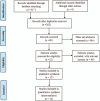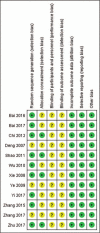The effectiveness of problem-based learning in pediatric medical education in China: A meta-analysis of randomized controlled trials
- PMID: 30633204
- PMCID: PMC6336616
- DOI: 10.1097/MD.0000000000014052
The effectiveness of problem-based learning in pediatric medical education in China: A meta-analysis of randomized controlled trials
Abstract
Background: The aim of this meta-analysis is to assess the effectiveness of problem-based learning (PBL) in pediatric medical education in China.
Methods: We searched Chinese electronic databases, including the China National Knowledge Infrastructure, WanFang Data, the China Science Periodical Database, and the Chinese BioMedical Literature Database. We also searched English electronic databases, including PubMed, Embase, and the Cochrane Central Register of Controlled Trials. We searched for published studies that compared the effects of PBL and traditional lecture-based learning (LBL) on students' theoretical knowledge, skill, and case analysis scores during pediatric medical education in China. All randomized controlled trials (RCTs) were included.
Results: A total of 12 RCTs were included, with a total sample size of 1003 medical students. The PBL teaching model significantly increased theoretical knowledge scores (95% confidence interval [CI], 0.79-1.52; P < .00001), skill scores (95% CI, 0.87-2.25; P < .00001), and case analysis scores (P < .00001, I = 88%) compared with those using the LBL teaching model alone.
Conclusion: The current meta-analysis shows that PBL in pediatric medical education in China appears to be more effective than the traditional teaching method in improving theoretical knowledge, skill, and case analysis scores. However, a more controlled design of RCT is needed to confirm the above conclusions in future work.
Conflict of interest statement
The authors have no conflicts of interest to disclose.
Figures








References
-
- Thurley P, Dennick R. Problem-based learning and radiology. Clin Radiol 2008;63:623–8. - PubMed
-
- McParland M, Noble LM, Livingston G. The effectiveness of problem-based learning compared with traditionalteaching in undergraduate psychiatry. Med Educ 2004;38:859–67. - PubMed
-
- Subramaniam R. Problem-based learning: concept, theories, effectiveness and application to radiology teaching. Australas Radiol 2006;50:339–41. - PubMed

